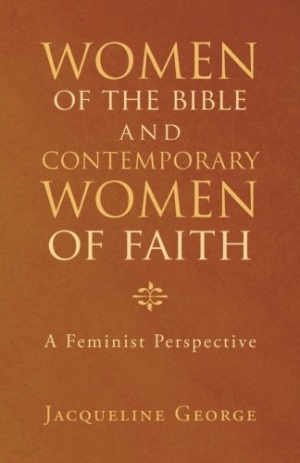Women of the Bible and Contemporary Women of Faith
A Feminist Perspective
Women of the Bible and Contemporary Women of Faith will provide inspiration to Christian women, in whom it will foster a sense of community solidarity.
Of the limited number of women in the Christian Bible who are named and offered a part of a story, even fewer play an important role in revelation. Religious scholar Jacqueline George, in Women of the Bible and Contemporary Women of Faith, retells the stories of these notable women with details that elaborate on the biblical text and provide a clear understanding of their purpose within the Christian mythos.
From Eve to Hagar to Jezebel and more, the women here each occupy their own chapter, allowing for great depth of research. In the latter section of the book, George also recounts the lives—or significant events in the lives—of post-biblical women, including Joan of Arc and Oprah Winfrey, describing the ways in which they too have revealed the word of God. These chapters are written with the same academic vigor as the biblical chapters and explore life lessons clearly. The inclusion of Malala Yousafzai may appear to be an odd choice since she is Muslim, but the contained moral sentiments do align with the book’s purpose.
Each chapter follows a formula that clearly details the story of a specific woman. The book moves chronologically through the stories in the Bible, detailing what each woman did that made her significant, then explaining how her actions fulfilled God’s prophecies. Every chapter ends without much by way of a conclusion, however, and there is little exploration of what these biblical women’s stories reveal about womanhood in society on the whole, in their own times or today.
While many of the insights that can be gleaned from the text are left for readers to infer, there is a clear connective theme: “God’s plan unfolded through the unorthodox actions of a woman.” Rather than a feminist analysis of women in the Bible, the book is a much-needed retelling of women’s stories, which are related here with clarity, enthusiasm, and deep understanding. These retellings are undermined by the fact that all analysis of their actions revolves around men—their husbands, fathers, and sons—without explorations of their independent and empowered lives.
The book remains objective except in a small handful of instances, as when it calls those who can’t make up their mind “wimpy Christians” or when it labels certain actions, like prostitution, as deplorable sins.
Women of the Bible and Contemporary Women of Faith will provide inspiration to Christian women, in whom it will foster a sense of community solidarity.
Reviewed by
Aimee Jodoin
Disclosure: This article is not an endorsement, but a review. The publisher of this book provided free copies of the book and paid a small fee to have their book reviewed by a professional reviewer. Foreword Reviews and Clarion Reviews make no guarantee that the publisher will receive a positive review. Foreword Magazine, Inc. is disclosing this in accordance with the Federal Trade Commission’s 16 CFR, Part 255.

